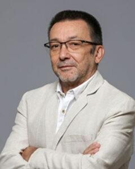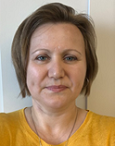|

|
|
Ratko MAGJAREVIĆ, University of Zagreb, CROATIA
Key drivers of biomedical engineering in Europe
Ratko Magjarević received his Ph.D. in Electrical Engineering in 1994 from the University of Zagreb, Faculty of Electrical Engineering. After his appointment in industry at the Institute of Electrical Engineering “Koncar,“ he joined the Electronic Measurement and Biomedical Engineering Group at the University of Zagreb, Faculty of Electrical Engineering and Computing. He is full professor teaching several courses in Electronic Instrumentation and Biomedical Engineering at undergraduate, graduate and at postgraduate studies.
His scientific and professional interest is in fields of electronic and biomedical instrumentation and digital health, in particular in cardiac potentials analysis and pacing, in research of new methods for drug delivery based on electropermeabilisation and recently in research of personalized intelligent mobile health systems. He is author or co-author of numerous journal and conference papers, several textbooks and book chapters. R. Magjarevic is elected for President of the International Federation for Medical and Biological Engineering (IFMBE) from 2022 to 2025.
|
|
|

|
|
Camelia Miron is currently Associate Professor at Nagoya University, Center for Low-temperature Plasma Sciences. She received her BEng. degree in 2003 from the Faculty of Biomedical Engineering, University of Medicine and Pharmacy of Iasi, Romania. She worked as Assistant Researcher at the Department of Materials, Physics and Energy Engineering, Nagoya University, Japan, from where she also received her Ph.D. degree in engineering in 2011, in the field of plasma discharges for material synthesis. She continued her work as an experienced researcher at the Institute of Macromolecular Chemistry “Petru Poni” of Iasi, Romania, at the Leibniz Institute for Plasma Science and Technology, INP Greifswald, Germany, and as an associate Professor at Shibaura Institute of Technology, Tokyo, Japan.
Her research interests are in structural modification and synthesis of new materials by plasmas formed in liquids (e.g. polymers, nanomaterials), and physicochemical investigations of plasma irradiated liquids (e.g chitosan, Ringer`s lactate, cyclodextrins, imines) for cancer treatment. She is a member of scientific societies (JSPS, Materials Science and Engineering), and an organizer and co-organizer of various national and international conferences. She acts as a reviewer for international journals, conferences, and grant agencies.
|
|
|

|
|
Peter Husar (SM '98) was born in Zilina, Slovakia, in 1956. He received the Dipl.-Ing. degree, the Dr.-Ing. degree (Ph.D.), and the habilitation degree (postdoc thesis) from the Ilmenau University of Technology, Ilmenau, Germany, in 1980, 1986, and 1999, respectively. From 1986 to 1989, he was with the Research Institute for Computer Engineering, Zilina, Slovakia, and with Siemens, Erlangen, Germany. From 1992 to 2005, he was a Researcher and Assistant Professor in biosignal processing, measurement technology, and sensor development at TU Ilmenau. From 2005 to 2006, he was with the University Clinics of Saarland, Germany, as the Head of the Medical Technology Center. From 2006–2007, he was a Professor of biomedical engineering at the University of Applied Sciences of Anhalt, Germany. Since 2007, he has been the Head of the Department of Biosignal Processing at TU Ilmenau. From 2010 to 2018, he also has been the Head of the Bio-inspired Processing Group at the Fraunhofer Institute for Digital Media Technology, Ilmenau, Germany. He has authored numerous publications in his research fields and several patents. Dr. Husar is a member of several expert groups and a senior member of the IEEE Engineering in Medicine and Biology Society.
|
|
|

|
|
Prof. Bart M. ter Haar Romeny (1952) is emeritus professor in Biomedical Image Analysis at Eindhoven University of Technology in the Netherlands. He obtained his MSc in Applied Physics from Delft University of Technology and PhD from Utrecht University.
He worked his whole career on biologically inspired medical image analysis algorithms, especially for computer-aided diagnosis (cancer, heart, brain, diabetes), image guided neurosurgery and visualization of brain connectivity from MRI diffusion tensor imaging. He initiated and leads the RetinaCheck project, a large international AI-based retinal image screening program for diabetes. He published over 250 papers (h-index: 54, > 18700 citations). For years, he has been teaching a popular national course on the neuro-mathematics of (medical) deep learning and human visual perception.
From 2009-2022 he was President of the Dutch Society for Pattern Recognition and Image Processing. He is past-President of the Dutch Society for Biophysics & Biomedical Engineering and the Dutch Society of Clinical Physics.
He is reviewer for many journals, conferences and science foundations, and organized several international Summer Schools. Prof. Romeny has been awarded many teaching awards, and is IEEE EMBS Distinguished Lecturer, Senior Member of IEEE, Fellow of EAMBES, Board member of IAPR, and Honorary Chair Professor at NTUST, Taiwan.
|
|
|

|
|
Valentin Dragoi received his bachelor’s degree in computer engineering from the Technical University of Iasi (Romania) in 1989. He subsequently received his Ph.D. degree from Duke University in 1997. His thesis was focused on learning and adaptive behavior and on computational neuroscience. As a postdoctoral fellow in the Department of Brain and Cognitive Sciences and the Picower Center for Learning and Memory at MIT, Valentin investigated the neural circuits of cortical adaptation in anesthetized and behaving animals. In 2003, he became an Assistant Professor at the McGovern Medical School at Univ. of Texas, Houston, where he currently holds the Levit Distinguished Professorship in Neuroscience. Valentin has been awarded a string of awards including the STAR Award from the UT System (2019), NIH BRAIN Awards (2015-present), NIH Director’s Pioneer Award (2010), NIH EUREKA Award (2009), James S. McDonnell Award (2005), and the Pew Scholars Award (2004). His research on the relationship between neural circuits and behavior was published in high impact journals, such as Nature, Science, Nature Neuroscience, Nature Communications, Neuron, PNAS, Current Biology, and eLife.
|
|
|